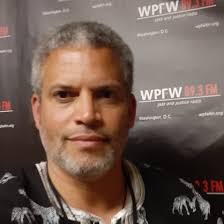To understand why great jazz radio still matters we’ve been turning to those essential jazz radio voices around the country who make a difference, and who continue to deliver the sound to their listening audiences and work diligently to grow the jazz audience. For part 3 of this ongoing series we hear from vocalist Andromeda Turre (heard throughout the week; check schedule), whose show Growing Up Jazz (she’s quite personally experienced in that title as the daughter of two exceptional musicians: cellist-vocalist Akua Dixon and master trombonist & conch shell fire-breather Steve Turre) is heard on SiriusXM’s Real Jazz channel, and two stalwarts from my home station, WPFW (89.3FM in the DMV; live streamed at www.wpfwfm.org), community radio in Washington, DC: veteran DC jazz show host Tim Masters (“Jazz Masters” Thursdays 10pm-midnight) and Craig Hall.

Andromeda Turre: The most well-rounded jazz radio programs are the generous ones. There is a sense of style and taste from the programmer, but they also consider music that the listeners love, even if it’s not always their favorite – so long as it’s good quality music!
I particularly favor a sense of balance and evolution with the music – keeping the tradition and the history at the listener’s top-of-mind, but also creating the space for living jazz artists and new original compositions so that the genre doesn’t become a museum piece.
In terms of talking to the audience, I like a similar approach, both including things like historic facts, band members and stories, as well as current and future happenings in the jazz world. This gives the listener the opportunity to augment their relationship to the music two-fold, hopefully deepening their place as a vital part of the jazz community.

Tim Masters: That’s an easy question to answer. A well-rounded jazz radio program entertains, informs, and engages. It provides context, and the occasional detail, when it’s important and when it matters. And a well-rounded jazz program takes the listener(s) on a musical journey of enlightenment and discovery. By discovery… I’m not just talking about “new” things. Personally I like to blend old and new. I like to bring an element of surprise (“The sound of surprise” ala Whitney Balliet and WPFW’s Larry Appelbaum), I want to deliver smiles not just of recognition (of say, an old favorite), but at all the twists and turns we take them on. If the sets are creative, that helps. If the selections weave together a story in music, it will (hopefully) grab the listeners. This could be achieved by blending old and new interpretations of the same tune, maybe mixing instrumental and vocal versions. It may be spotlighting a particular composer, or leader, or arranger, or sideman/woman. It could be a thematic arc (I especially like those!). It might be the lyrics themselves that are somehow related – even a single important phrase in a lyric – or, on a broader note, it may be the subject matter. It could be jumping from one genre of jazz to another, or illustrating/demonstrating how one genre led to another. Of course, I also like to occasionally mix things up with interesting (some may call them “odd”) contrasts. Something surprising. Maybe Mahalia Jackson or Sister Rosetta Tharpe, followed by Thelonious Monk… maybe Charlie Parker followed by Gil Evans playing Jimi Hendrix. Maybe something even stranger and more unexpected. Unexpected is an important part of the equation in my book. For reference, it’s kind of like the musical equivalent of the “impossible interview” caricatures that Covarrubias used to draw for Vanity Fair decades ago.
An important sidebar: All of these approaches to radio program production should all be presented in a natural, unpretentious way… not condescending to the audience at all… but leaving it to the listeners to hear, discover, recognize, and interpret in any way they choose to see fit. It also helps to sound and to be engaged. If I’m having fun, my hope is that [the listeners] will too. If I’m excited to share what I love about the music, I’m hoping that they’ll be excited to be hearing it… and if one plays one’s cards right, perhaps the audience will grow to love it as well… or love it even more.
My favorite analogy when discussing my approach to producing a jazz radio program – which i’ve been doing now for going on 47 years – is that we go in working with a blank canvas and we paint as we go. Lots of broad strokes, with an attention to detail in specific spots. Flourishes here and there. Our goal, as with any fine painting, is to draw the listener in. By the end of the program my goal is to have presented a complete and finished work that has brought the audience along with my throughout. They understand the process. They see the big picture. They “get it”. My hope is that their spirits have been lifted, their minds have been stimulated, their ears are happy, and I’m leaving them wanting more… and wondering wha I’ll be weaving, “painting”, or creating next time around.

Craig Hall: I’ve been hosting and producing music programs at WPFW for nearly 5 years. I was the former host for “The Continuum Experience” and currently I co-host “Brother Ah’s Collectors – Next Generation of Sound” [the WPFW show formerly programmed by the late Brother Ah, aka longtime jazz recording session French hornist Robert Northern] as well as an occasional substitute host for more than a dozen programs at the station.
The concept of being “well-rounded” suggests to me that something or someone is broadly inclusive and striving toward being comprehensive at some level. A “well-rounded jazz radio program” then, suggests two things: that the music played on the program is “Jazz” and not [music] of other genres; and that the playlist of any given show either represents as broad a spectrum of the music possible within the time given, or that the aggregated playlists of the show over time does so. The first point is one that I have found cannot be taken for granted. Just as we see so-called Jazz Festivals around the country headlining what amounts to be the best of Soul/R&B targeted toward adult audiences and little to no “Jazz” at all. I also hear programming that is billed as “Jazz” that is guilty of the same format. The second point exposes the challenge in being able to present all the music that has been created historically, as well as the current expressions of the music. How do you have a well-rounded” program when the source materials continues to expand, and we can never catch up to it?
Being “well-rounded” is a dilemma for the Jazz Programmer because it is impossible to be comprehensive. I assume there is a portion of the listening public that responds best to programming which skims across a wide swath of “the music” and its sub-genres and styles. That is the portion of the listening public that can be solidified into a loyal audience for a program of that type. This audience prefers variety over focused programming. They want as much of a mix as the programmer can provide of music that is vocal and instrumental; historical and new; straight ahead and experimental; ballads and upbeat; and which includes all the stylesthat have evolved from the 1920s until today.
Other portions of the listening public respond better to programming that is focused on the one or several areas for which they have an interest and appreciation. A “well-rounded” program to them feels inconsistent and inefficient. They don’t want to listen for two hours only to hear ten minutes of music that they really love. This type of audience is best served by a “focused radio program” that gives them two hours of music that they love, during the two hours that they are listening. This is particularly important in community supported radio, because it creates the conditions that lead to a loyal, residually giving audience for a particular show. Ultimately, “well rounded” and “focused” programming both have their place and serve their respective audiences that are looking for that type of experience. A radio station needs to have both well-rounded and focused Jazz programs to really cover the bases with its audience, so I would say that all “Jazz” radio programs need to be well-rounded.
From either perspective, programmers must make choices about what to play and what not to play in the time given. In most cases I believe those choices are made from a philosophical point of view or guiding principles; in other words the choices are guided by some thoughtfulness and rationale as opposed to being random. I think that this is important to do because it results in the highest likelihood that the music will be presented in the best way academically and emotionally. I believe that listeners prefer the presentation of music in such a way that it is leading them somewhere. They prefer “flow” over musical whiplash and digest the musical information better when it is provided to them with mental and emotional intelligence, as opposed to ina. way that feels like chaotic randomness. I feel like this is important to acknowledge because I have heard some programs that consist of random music that the programmer picked up at a yard sale over the weekend. The selection of music is not selected at all with any coherent intenton.
Having said that, I DO have a philosophy that guides my process of determining what music I will play on my show. It involves several factors, perspectives, and circumstances that mermge in a complicated and elastic algorithm that ultimately results in a final playlist that I can be proud of. The foundation of my guiding philosophy is the belief and understanding that “Jazz” music is African music in its cultural identity and pioneering expressions. It was created by the descendants of African people who were prisoners of war and enslaved in the United States. It is a product of African culture and the genius of African people, using whatever tools, knowledge and methods we deemed necessary to create, borrow, adapt or adopt. Musicians and listeners from other cultures may enjoy it and play it but that does not negate its African identity and source. People all over the world like pizza, and make pizza, but this doesn’t change the fact that pizza is Italian, and beyond pizza itself, only Italians and Italian culture can determine the course, direction and authenticity of the Italian cuisine that people around the world enjoy. My on-air music choices reflect the understanding that “Jazz” is African music, and it is a cultural treasure that stands as proof and testimony to the world and ourselves as to our inherent power and greatness. I present the music of African artiss whatever country or continent they may be from over the music of mediocre white or European artists who have been given credit and attention due to white privilege in a racist society. This doesn’t mean that I universally exclude white artists from my playlists, just that I don’t include any who are mediocre no matter how successful, accepted and famous their privilege may have made them.
The second most important element of my guiding philosophy is to include music that reflects spirituality in its intentions. That means I give preference to music that has spiritual and even religious messages or qualities over music that is the soundtrack to physical and material appetites. This preference is just a preference and not an absolute determinant. My purpose for each show is to “enlighten the mind, uplift the spirit, and strengthen the soul” and the music i select must support that purpose or at least not be in contradiction to it.
The third critical element of my philosophy that influences my play lists is the representation of social and political consciousness. Wherever possible, I try to include music that has a constructive or progressive political message in its lyrics, title or feeling. Most music does not satisfy this condition, but whenever it does, I am likely to include it for my show.
I also strive to be accountable to the history of “Jazz” music by making sure that I present the music of the “masters” and pioneers to provide a context of continuity and to preserve “Jazz’s” historic legacy. I think that is our responsibility, to remember our ancestors, teachers, elders and those that laid the groundwork for the culture and life that we benefit from today. Honoring history is a process of teaching and learning that is an important part of what I try to accomplish with my show. By including “the greats” in my playlists I’m also responding to the expectations of most “Jazz” listening audiences that they will hear copre, foundational artists and songs when they tune in.
No philosophy or show is completely inclusive. Most of the music I play was recorded after 1955, with a particular emphasis on recordings made between 1968-1972. This is simplky because I will only play music that I like, and I can only play muisic that I have. I like the “Jazz” music associated with hard bop forward, more than the music from bebop going back. Consequently this preference is reflected in my collection and impacts the historical scoope of the music that I can present. One of the reasons for my preferences is my age, and the fact that African culture was experiencing a political and spiritual renaissance and rise in African consciousness during the 1960s that best supports my philosophy.
In counterbalance to preserving history, I think it is important to present newly recorded music from artists performing and recording today. The music is alive and thriving and continuing to expand into new parts of the world and the emerging generations. The new music is exciting because it is the modern extension of all that has come before it. In that same vein I will also try to include the music of local artists, who should be able to count on the station and my show to distribute their music through the airwavws. These are the artists that we can go out and see perform at local venues, and I feel like my show should be informing people about who these artists are. Increasingly it is becoming important to terrestrial radio to serve the listening community and connect with local cultural agents in a way that the national media services cannot do.
For my show I learned to include vocalists in additional to instrumental music. This came about when I bewgan hosting a show that was preceded by another program that was about 90% vocalists. To retain listeners from the previous show, I learned to begin my show with vocal music that fit within my own philosophical parameters, even though knowledge of vocal music was not my strong point. This was a shortcoming that I havw strived to fix since vocal music is very vibrant and important to what I am trying to accomplish. Unlike instrumental music, vocal music is genderized because the vocal instrument is obviously male or female. Because of my belief in balance, I usually try to include equal numbers of male and female vocalists in my playlists.
Finally, I think that it is important to “spice” up my show periodically with surprises. These are music choices that fall outside of normal parameters and expectations and provide variety that is intended to be refreshing to he listener. I think it is important to be consistent in order to build an audience and gain their trust. It’s important to throw in something unexpected now and then so that the show and the audience can continue to grow and evolve.
